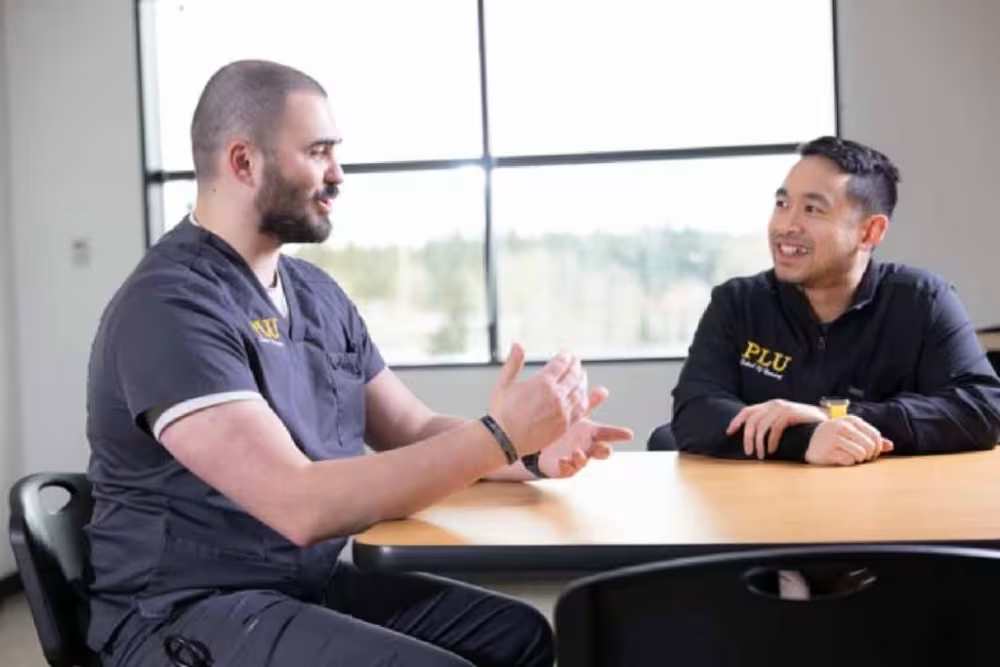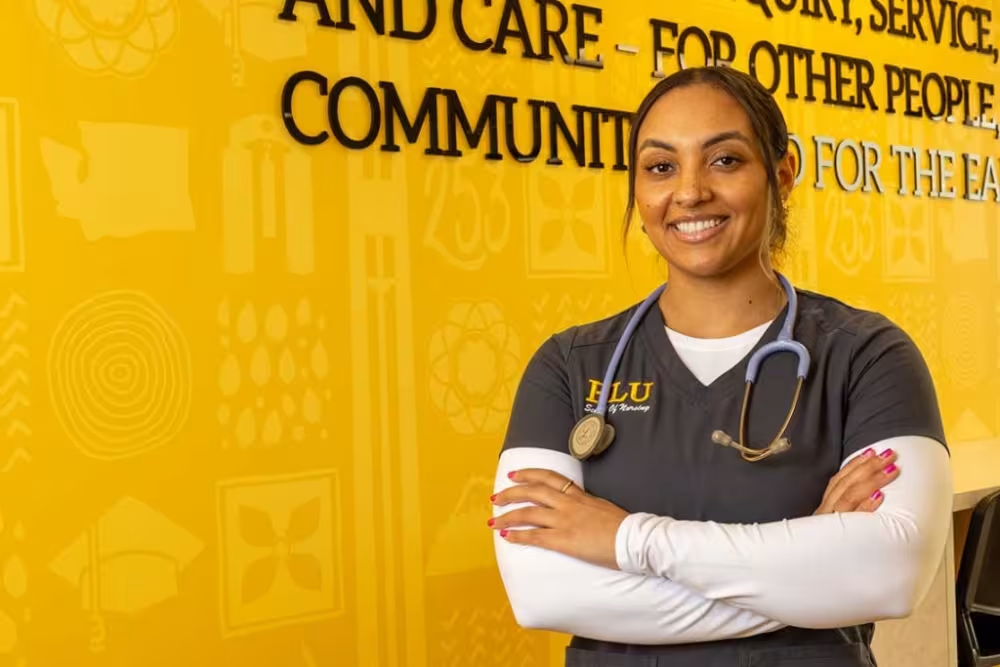What Is Community Health vs Public Health Nursing?
Each blog post is dated and contains accurate information as of that date. Certain information may have changed since the blog post’s publication date. If you would like to confirm the current accuracy of blog information, please visit our ABSN overview page or contact admissions at (866) 891-9308.
Understanding community health vs public health is key for future nurses. Community health focuses on local outreach and care, while public health addresses broader policies and prevention. PLU’s ABSN program prepares you for both paths, empowering you to make a difference in diverse communities and populations.

Are you looking to become a nurse who makes a difference in the health of entire communities? Then a career in community or public health nursing might be perfect for you. While community health often focuses on specific local groups, public health extends to broader populations, like entire states. Though these two areas share a common goal, understanding community health vs public health can help you choose your path.
At Pacific Lutheran University (PLU), our Accelerated Bachelor of Science in Nursing (ABSN) program is designed to prepare you for diverse nursing roles, including those that profoundly impact both communities and the general public. If you already have a bachelor's degree in a non-nursing field or at least 60 college credits, you could earn your nursing degree in as few as 16 months.
Now, let’s explore how community health and public health nursing compare and see where your nursing education can take you.
What Is Community Health Nursing?
Community health focuses on promoting and protecting the health of individuals and families within specific neighborhoods or groups. These nurses often work directly in the community to address barriers to care, provide health education, and advocate for healthier environments. Settings can include schools, local clinics, or patients’ homes. Duties of a community health nurse might include:
- Advocacy and outreach
- Assessment and monitoring of population health
- Care coordination and case management
- Direct patient care in a community setting
- Health education
- Policy development and program implementation
- Preventive care and disease control
- Responding to emergencies and disasters

What Is Public Health Nursing?
Public health considers the health of broader populations at the city, state, or national level. According to the American Public Health Association, it is typically responsible for the following:
- Addressing the impact of climate change on health and other issues
- Advocating for laws
- Developing school nutrition programs
- Setting safety standards
- Tracking disease outbreaks and vaccinations to prevent the spread
Public health nurses with a BSN are vital in shaping the health of entire populations, focusing on prevention, education, and advocacy at a population level. They often work for government agencies (local, state, federal), nonprofit organizations, or large health care systems that have a community focus.
Example duties include:
- Community engagement and partnerships
- Disease surveillance and outbreak management
- Emergency preparedness and response
- Environmental health protections
- Health policy and advocacy
- Program planning, implementation, and evaluation

If you’re planning to start nursing school soon, check out these 10 tips for how to prepare.
Key Differences Between Community Health and Public Health Nursing
The primary difference between community health vs. public health nursing is scale. Community health nurses engage directly with people in their local communities, often through outreach and education. Public health nurses, meanwhile, focus on ensuring health through policy and prevention efforts. Community health is patient-centered, while public health emphasizes systems and data collection. Both are essential to promoting wellness.
Nurses’ Impact in Community and Public Health
Nurses play a crucial role in achieving positive health outcomes for both the community and the broader population. They can help prevent chronic diseases, promote better lifestyle choices, and educate patients. They can also help remove barriers to receiving care.
Improving Health Outcomes
Nurse involvement in health education and promotion has helped prevent diseases, increase patients’ ability to manage chronic conditions, and improve health outcomes.
For example, in a study of patients with advanced breast cancer, nurses were instrumental in keeping patients engaged in managing their treatments and symptoms.
Activities of both community nurses and public health nurses can contribute to improved outcomes.

Building Trust and Advocating for Communities
Because nurses tend to spend more time with patients than some health care providers, they can build trust through dialogue and listening to patients’ stories. When trust is gained, nurses can help patients identify problems and promote healthy lifestyle choices.
The U.S. Department of Education’s research shows that only 12% of English-speaking adults in the country have proficient health literacy, meaning that most have limited knowledge. This has a significant impact on low-income and elderly populations.
Community nurses directly support patients by providing care and connecting them with needed resources. Public health nurses, on the other hand, enhance overall well-being by monitoring diseases, developing health programs, and contributing to the creation of regulations that benefit everyone.
Career Paths in Community and Public Health Nursing
Whether your interest lies in hands-on community outreach or strategic planning, the first step to working in community health or public health is to become a registered nurse (RN). The path to becoming an RN typically involves three main steps:
- Enroll in a nursing program
- Earn a nursing degree, typically an Associate Degree in Nursing (ADN) or Bachelor of Science in Nursing (BSN)
- Pass the NCLEX-RN and become licensed in your state
Nursing programs typically include didactic courses, hands-on labs, and in-person clinical experiences.
Pacific Lutheran’s ABSN program is dedicated to improving health care for all by increasing health equity and eliminating health disparities, a noble goal for both community and public health. The ABSN curriculum includes the following components:
- Online coursework focusing on the fundamentals of professional practice
- On-site skills and nursing simulation labs to help you develop skills in a safe environment
- Clinical rotations and local facilities where you will provide care to actual patients and experience various settings
The program leverages your prior degree or college credit, enabling you to earn your nursing degree in as few as 16 months and confidently take the NCLEX exam. Once you have received your license, you will be ready to start your journey as a practice-ready nurse, although you might need to gain some experience before working in community health, public health, or another related specialty.

Continuing Education and Skill Development
After gaining experience in community health, you may decide to pursue an advanced degree, such as a Master of Science in Nursing (MSN) or Doctor of Nursing Practice (DNP). You can also pursue career advancement by becoming an advanced practice registered nurse (APRN) or assuming a leadership role, such as clinical nurse manager.
The National Registered Nurse Practice Development Center offers a National RN Population Health Nurse Certificate Program for RNs focused on improving the health of populations in “primary, ambulatory, and community-based settings.”
The Seattle area is a great place to study nursing. Here’s why.

Nursing Employment
The demand for nurses is expected to continue growing. The U.S. Bureau of Labor Statistics doesn’t track the occupational outlook specifically for public health or community health nurses; however, employment for registered nurses (RNs) is expected to grow 6% from 2023 to 2033, which is faster than the national average.
Start Your Nursing Career With Pacific Lutheran’s ABSN
Whether you’re drawn to hands-on community care or large-scale health initiatives, a career in nursing offers purpose, impact, and growth.
Pacific Lutheran University's ABSN program is designed to equip you with the essential skills, knowledge, and real-world experience needed to launch a thriving career in either community or public health nursing. Through comprehensive online coursework, hands-on labs, and crucial clinical placements throughout the Seattle area, you'll gain the foundational understanding of population health, disease prevention, and community engagement. You'll graduate prepared to sit for the NCLEX-RN—the vital national exam required to become a licensed Registered Nurse—and make a profound difference in the well-being of individuals and communities alike.
Ready to take the next step? Contact us to start your nursing journey.
